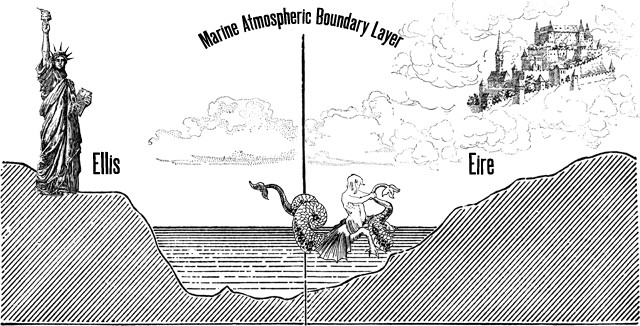Naturalized SelectionImagine two quaint isles of contrasting shades. Let’s pull a couple of names out of a hat—perhaps
Eire and
Ellis. (
Galapagos sounds too fancy.) We’ll paint one a brilliant emerald and the other a dull patina. Not long after a dreamy-eyed Darwin imagined a process of natural selection increasing complexity, the oxidizing eyes of Lady Liberty magnified simplicity for a million Irish immigrants: O’Conghalaighs devolved into Conleys, their family trees pruned down to a stump upon which to rest their weary feet. New books of genealogy, too modest for High Kings,
began at Ellis Island. Straightforward Conleys carried on, oblivious to the echoes of their ancestral namesakes, such as dynast Conall Corc, or his fourth great grandfather Conn of the Hundred Battles (son of the passionate, furious High King Fedlimid Rechtmar, himself the son of a deity). In all fairness, from the perspective of the New World—factoring in the curvature of the earth and atmospheric distortion—it’s impossible to glimpse the glimmers of High King Crimthann Nia Náir’s silver-bossed shield or his sword’s inlaid golden serpents, both treasures purloined from the fairies. No fairies are perceptible on the lawns of Ellis Island. Where there’s no turning back, history morphs into mythology.
To stand upon the shoulders of the mighty requires not only a colossal step up but also concerted balancing and adjusted perspectives. What a hefty responsibility comes with owning one’s exalted heritage. What an effort of imagination it takes to draw one’s birthright into the limelight so as to illuminate the missing letters in one’s name. To be sure, a streamlined spelling can be a beautiful thing, so long as it meets the requirements of conciseness: clarity and completeness. Foggy origins and butchered derivations do not for a clear word make. And while it’s quaint to consider one’s home one’s castle, let’s not forget that every stony fortification begins as a "castle in the air” or, in the case of the Irish, quite literally a "castle in Spain”—as in King Milesius of Spain (1000 B.C.) who remembered a prophecy that his descendants would rule Ireland.
When our missing letters are of royal and/or magical origin, we find ourselves facing some rather profound questions and challenges. To what crown(ing glory) is one the natural successor? To what dignities? What traditions are one’s responsibility to keep alive? What untapped powers? If one’s Weltanschauung does not account for an Otherworld, how can one reconcile one’s nymph-glands? How are the descendants of a Celtic deity to appease another holy ghost? Truly, to scale ancestral branches is to hang topsy-turvy with Odin on the World Tree.



